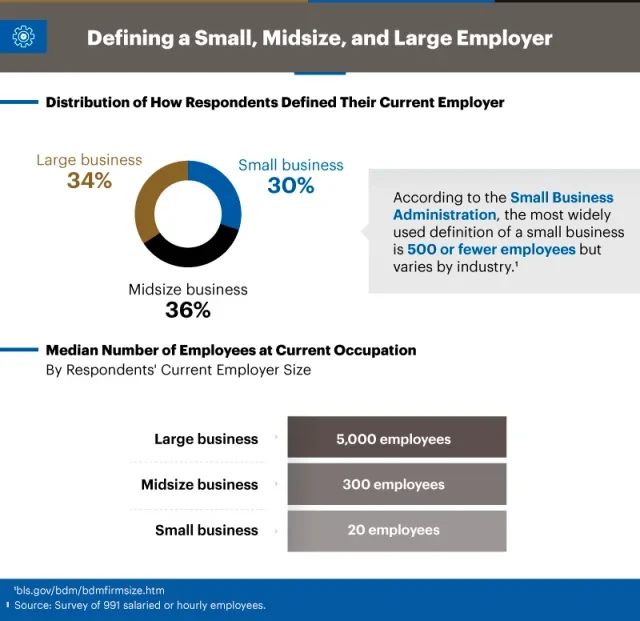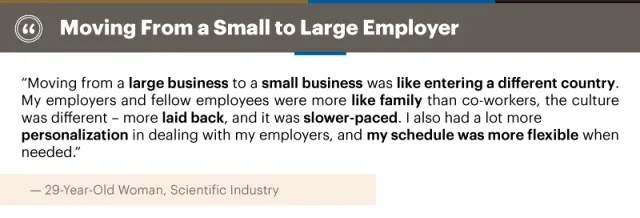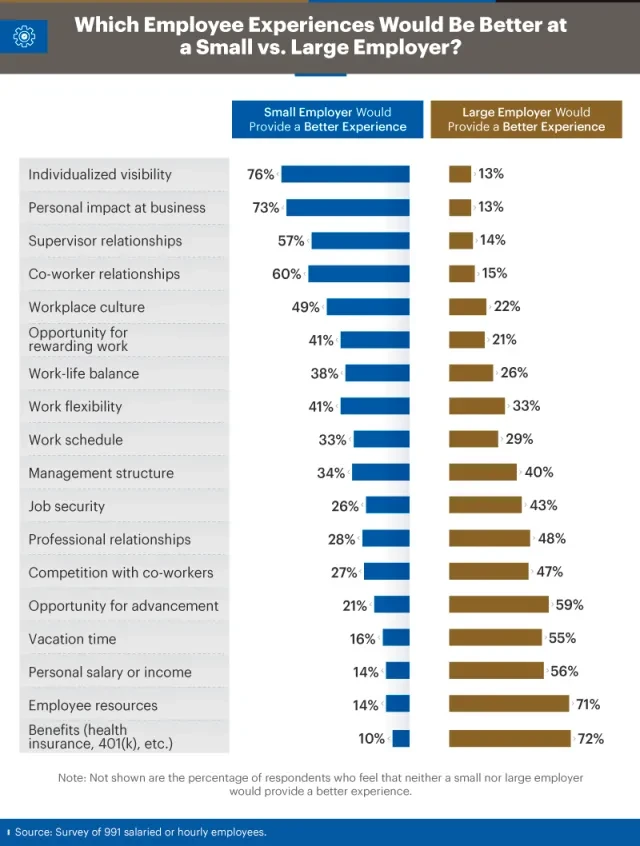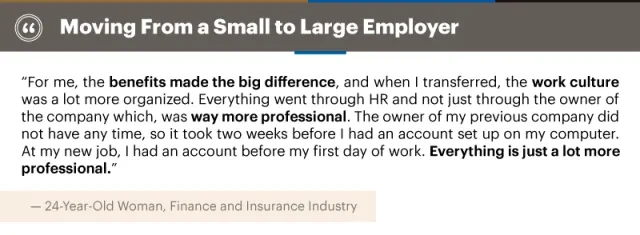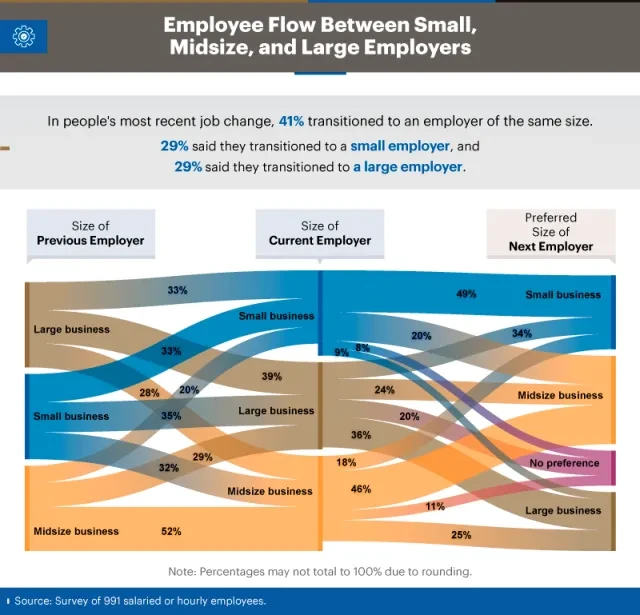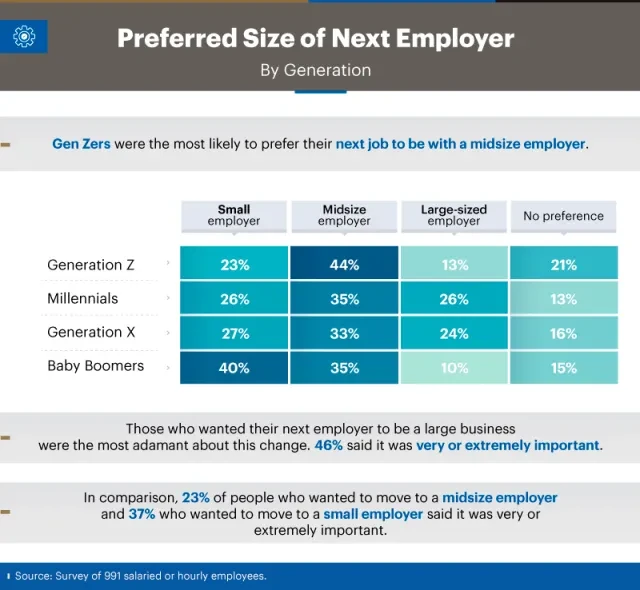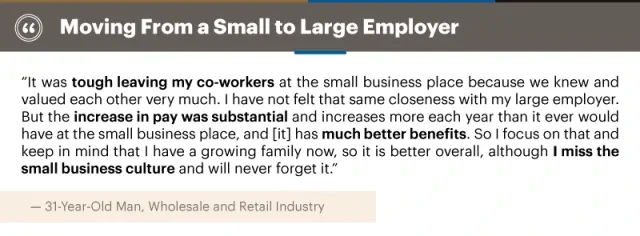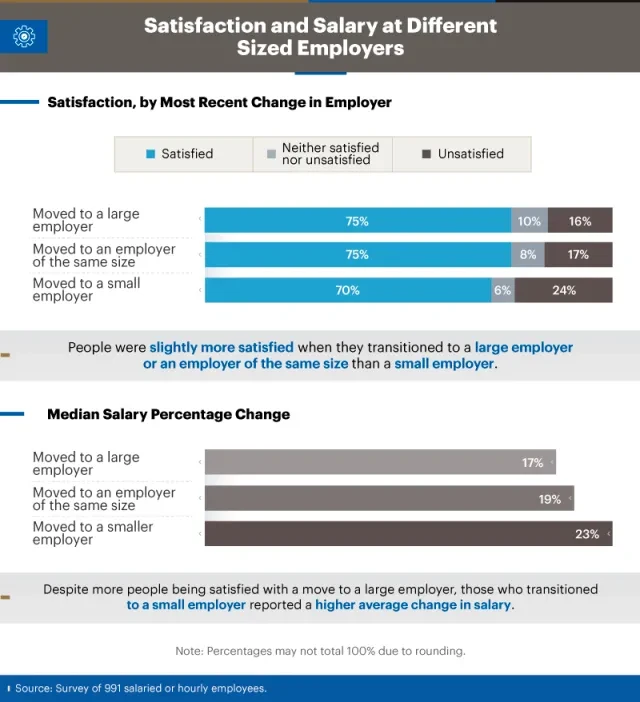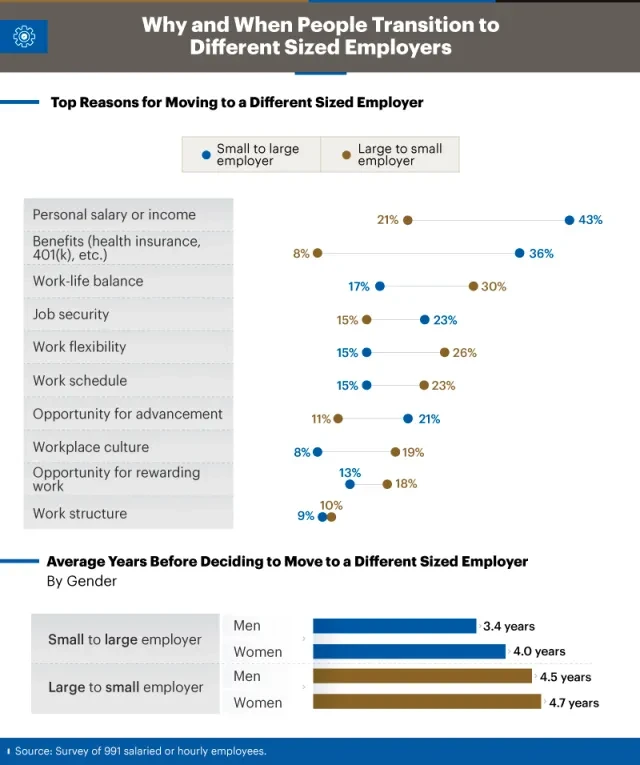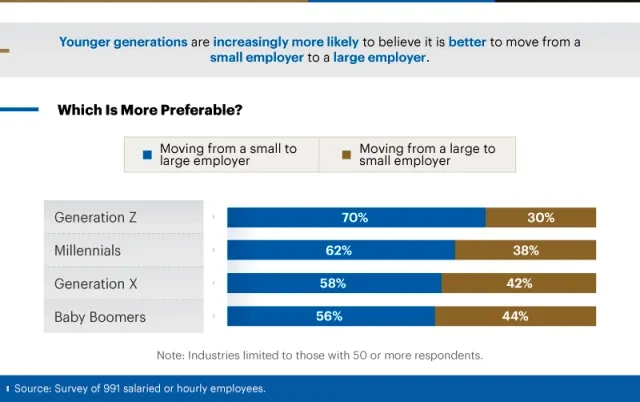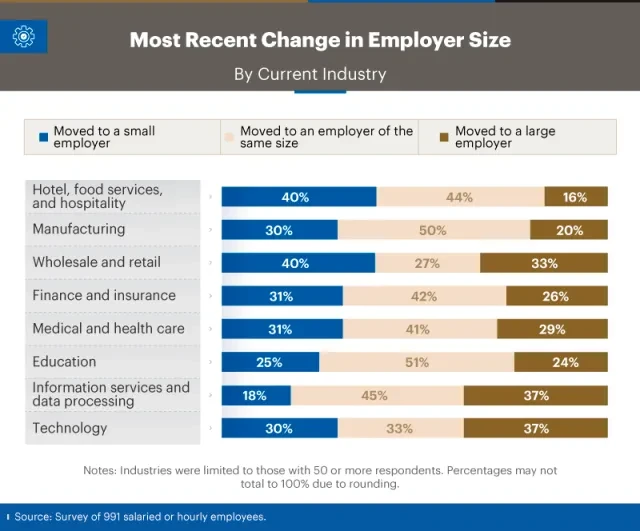- Administración
- Artículo
- Lectura de 6 minutos
- Last Updated: 09/09/2019
Small vs. Large Employers: The Pros and Cons of Who You Work For

Table of Contents
We’ve seen it countless times in movies — big businesses move in and force smaller companies to close their doors. While businesses of all sizes can be portrayed in a poor light, each make important contributions to innovation and jobs. Nevertheless, people are over three times more likely to have a high level of confidence in small businesses compared to big businesses.
But are these perceptions mirrored in employee actions? Do employees forgo larger corporations for smaller ones, or do they follow the money big businesses can often bring? We surveyed over 991 employed Americans about their preferences regarding big and small employers, and analyzed their flow between each. Keep reading to see what we found.
Defining business sizes
The line between big and small businesses can get blurry. While the U.S. Small Business Administration (SBA) uses multiple thresholds of employees depending on the industry to differentiate between business sizes, these classifications are often for regulation purposes. Classifying a business as a small-to-medium enterprise (SME) also differs based on the country. While some countries look at the number of employees, others use annual sales, assets, or a combination of these factors to classify businesses.
For clarity, we asked respondents to define their industry as small, midsize, or large and used their definitions as classifications. Thirty-four percent worked for a large business, while 36% worked for a midsize business, and 30% worked for a small one. On average, respondents defined a large business as one with 5,000 employees, while a small business had just 20.
When size matters
The number of employees is an obvious indicator of a business’s size, but it also says a lot about the work environment. Larger corporations with thousands of employees tend to be more structured and team-driven, while smaller businesses can be more intimate and personable. Employees recognized these differences and thought small employers would provide a better experience with individualized visibility, personal impact on business, and supervisor and co-worker relationships. Alternatively, the majority of employees thought large employers were better suited to provide benefits, employee resources, and personal salary or income.
Employees also felt large businesses provided more opportunity for advancement — compared to just 21% of employees who thought small businesses would provide better opportunity to advance, nearly 60% thought they could climb the ladder easier in a large corporation. While the majority of employees were right — large companies often have promotions and position movement built into their business — employees were slightly off when it came to job security.
Over 40% thought they would have better job security with a large employer, while 26% of employees thought smaller meant more secure. The intimate and personal environment that comes with small businesses often leads to a sense of family among employers and employees, making it more difficult for job cuts to occur.
Choosing the right path
The workforce is always changing, and with an influx of millennials, work culture is following their desires. While better benefits packages are an increasing trend, so is working remotely and having a more flexible schedule. With small employers typically offering more flexibility, are employees switching sides? In people’s most recent job change, 41% transitioned to an employer of the same size, with an even amount transitioning to both a small and large employer.
While those holding positions with midsize employers were the most likely to transition to an employer of the same size in their most recent move, employees currently working for small employers were the most likely to have another small employer in their next transition. Only 8% of employees currently working for a small employer planned on making the jump to a large employer at their next job.
Getting smaller with age
The focus has largely been on millennials taking over the workforce, yet Generation Z is starting to join and may bring bigger changes than the previous generation. While they’re just beginning their transition, the youngest generation was the most likely to prefer their next job be with a midsize employer. Millennials, on the other hand, were split in their responses.
Thirty-five percent of millennials preferred their next job to be with a midsize employer, but 26% either wanted a small or large employer. Gen Xers shared very similar sentiments as millennials, but baby boomers preferred small employers significantly more than large companies. Compared to just 10% of baby boomers preferring big business, 40% preferred to take their work to a small employer.
The generational differences may just come with age. For example, some millennials have their eyes set on some of the biggest names in the business — Google, Apple, and Amazon, to name a few — while there are baby boomers who are skipping retirement and starting their own businesses.
Satisfying shifts
Most people seem to know what they want out of their next job — at least when it comes to size. So are they satisfied with their choice or missing what they had before? For the most part, employees were satisfied regardless of their employer’s size, but people were slightly more satisfied when the move was to a large or similar-sized employer. This has nothing to do with money, though. People may look toward big business as the big earners, but employees who moved to a small employer reported a higher average change in salary than those who moved to one of the same size or larger. Rather than focusing on finances, increased satisfaction may be related to work culture and environment, with employees putting more emphasis on their work/life balance than money in their pockets.
Time to leave
Money may not be the end-all-be-all of job satisfaction, but it is the main reason employees moved from small to large employers. Thirty-six percent of employees making this transition also did so for the benefits like health insurance and a 401(k). On the flip side, 30% of employees moving from large to small employers did so for the work/life balance, and 26% made the move for increased flexibility.
Regardless of the size of the employer, more people don’t stay with one company for their entire career. However, those making the transition from large to small employers took the longest to do so, with men taking an average of 4.5 years and women taking an average of 4.7. Women also took longer to move from a small to a large employer, taking an average of four years compared to just 3.4 for their male counterparts. While the gender differences are clear, there’s no clear reason as to why they exist. One thing is for sure, though — transitioning from job to job is not looked at as negatively as before. In fact, job hopping happens more than ever and is viewed as perfectly fine as long as it’s within reason.
Is bigger better?
Overall, younger generations were more likely to believe it was better to move from a small to a large employer. This may be due to the large companies younger employees are after. Tech giants like Amazon, Google, and Apple are more enticing to millennials and Gen Zers, possibly due to innovations, job security, and room for growth.
Within an industry
Thirty-seven percent of those working in technology moved to a larger employer in their most recent transition, and 37% of those in information services and data processing also upsized. On the other hand, employees in wholesale and retail were more likely to move to a small employer. Still, a third of wholesale and retail employees moved to a large employer.
Wholesale and retail industries (e-commerce, pop-up retailers, and personalized retail) were among the top 10 most thriving despite more employees moving to smaller employers. Consumer retail is expected to see a 1.2% increase in revenue and a 103% increase in jobs by 2026. The hospitality industry expects an even larger growth, with an increase in revenue by 2.4% and an increase in jobs by 108%. As these industries grow and shift, the size of their businesses will likely follow.
Booming business — regardless of size
The relationship between big and small businesses is not always what it seems. On the outside, it can look like a big-fish-eats-little-fish scenario, but businesses of both sizes are vital to the country’s economy. However, the differences between business sizes go much deeper than money. Employees are not always looking to increase their salary by moving to a larger employer — often, they are in search of a better work/life balance or room to climb the corporate ladder. It all comes down to personal preference and aspirations for the future.
However, the wants of employees are important for both small and large employers. Whether it’s offering better benefits, more flexibility, or having high-quality teams on board, our experts at Paychex are here to help. To learn more about how we can help your business thrive, visit us online today.
Sources
-
https://www.theatlantic.com/magazine/archive/2018/04/learning-to-love-big-business/554096
-
https://www.ecfr.gov/cgi-bin/text-idx?rgn=div5;node=13%3A1.0.1.1.17#se13.1.121_1106
-
https://www.sba.gov/federal-contracting/contracting-guide/size-standards
-
https://www.pewresearch.org/fact-tank/2018/04/11/millennials-largest-generation-us-labor-force/
-
https://www.inc.com/young-entrepreneur-council/how-workforce-will-change-in-2019-6-predictions.htm
-
https://www.inc.com/magazine/201611/bill-saporito/korn-ferry-engagement.htm
-
https://www.inc.com/ryan-jenkins/top-10-preferred-employers-of-millennials.html
- https://www.cnbc.com/2018/10/16/top-10-industries-that-are-hiring-thriving-and-making-money.html
Methodology
We conducted a survey of 991 Americans who were employed full time. Respondents were then asked questions about their perceptions of different sized employers as well as any experiences with transitioning between different sized employers. Fifty-four percent of our respondents identified as male, 45% identified as female, and less than 1% identified as a gender not listed on our survey. Respondents ranged in age from 18 to 81 with a mean of 36 and a standard deviation of 10.7.
Limitations
Industries were limited to those with a sample size of 50 or more. The lowest sample size for generation was baby boomers with 72 respondents. It is possible that with more respondents from each industry or generation, we may have been able to gain better insight into these demographics. The data we are presenting rely on self-reporting and, as such, are susceptible to exaggeration or selective memory. No statistical testing was performed. The claims listed above are based on means alone and are presented for informational purposes.
Fair use statement
Deciding to find a new job can be stressful, especially if the transition includes a change in employer size. To help others gain some clarity, feel free to share this project for noncommercial purposes. If you do choose to share our content or graphics, we ask that you please link back to this page to give the authors proper credit.
Tags

